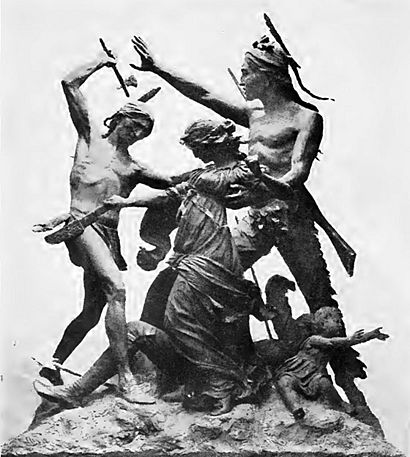The Fort Dearborn Massacre Monument facts for kids
Quick facts for kids The Fort Dearborn Massacre Monument |
|
|---|---|
 |
|
| Artist | Carl Rohl-Smith |
| Medium | Bronze sculpture |
| Location | Chicago, Illinois, U.S. |
The Fort Dearborn Massacre Monument is a large bronze sculpture created in 1893. It is also known by other names, like Potawatomi Rescue or Black Partridge Saving Mrs. Helm. This artwork was made by a sculptor named Carl Rohl-Smith. You can find it in Chicago, a big city in Illinois, USA.
The statue stands about nine feet (three meters) tall. It shows a very important moment from history. The sculpture features Black Partridge, who was a chief of the Potawatomi people. He is shown saving Margaret Helm. She was the wife of a U.S. army officer. This event happened during the Battle of Fort Dearborn in 1812.
It's good to know that this monument is different from another sculpture called Defense. That one was made in 1928 by Henry Hering. Defense also shows a scene from the Battle of Fort Dearborn. You can see it on the side of the DuSable Bridge in Chicago. This bridge is near where the old Fort Dearborn used to be.
Contents
History of the Monument
The Fort Dearborn Massacre Monument has an interesting past.
How the Statue Was Made
A wealthy businessman named George Pullman asked for this monument to be built. He wanted to remember the events of the Battle of Fort Dearborn.
Where It Was First Placed
The statue was first put up near Prairie Avenue and 18th Street in Chicago. People at the time believed this spot was where the Battle of Fort Dearborn actually happened.
Moving the Monument Around
Over the years, the monument has been moved several times. In 1931, it was moved indoors. It found a new home in the lobby of the Chicago History Museum. Later, sometime in the 1980s or 1990s, it was moved back outside. It was placed close to its original location. After that, the monument was moved again. It was taken down and stored in a warehouse.

